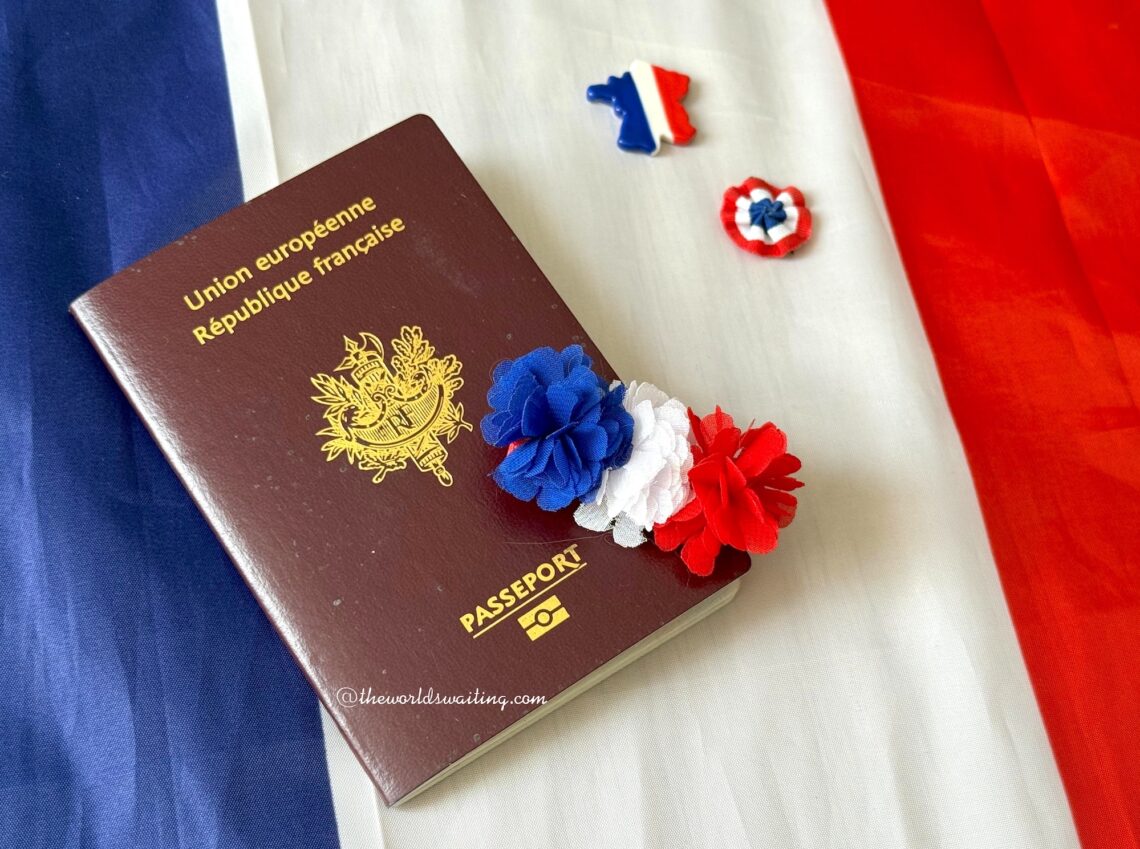
Becoming French – My Guide on How to Apply for French Citizenship
Whether you’ve always dreamed of living in France, married a French person, or found yourself living in the country, applying for French nationality can seem overwhelming. How do you apply to become French? What are the first steps to obtain French nationality? Where can you find more information?
The good news is that applying is straightforward. Waiting for progress updates is harder. Of course, everyone’s situation is different, and there can be surprises along the way, but if you can understand and speak French, and can prove that you meet the necessary requirements, why shouldn’t you apply to become French? Based on my experience of the process, here is my guide about how to get French nationality.
Am I eligible to apply for French citizenship?
There are two ways to obtain French nationality:
- Naturalisation (this means applying as an individual without a family connection to France)
- Déclaration de nationalité (this applies if you are married to a French person or have a relevant French relative eg. Child, grandchild or sibling)
Requirements to obtain French nationality by naturalisation
- Five consecutive years legally resident in France (this can be reduced to two years if you completed higher education in France).
- Proof of a stable income
- Evidence of your integration into French society
- French language test
- No serious criminal record
If applying by declaration, especially in the case of marriage, the requirements seem a bit less stringent and focus more on determining the genuine nature of the relationship.
How to prepare your dossier (the paperwork)
Check which documents you need to provide and expect the list to be long! Requirements vary depending on individual circumstances. The French government website provides a simulator which, once you have answered the questions, provides a useful checklist (Documents nécessaires à la constitution de votre dossier de naturalisation). The page is also, helpfully, available in English. If you still have questions, it is probably best to contact your local prefecture.
Which documents do you need to apply for French citizenship?
In addition to providing the completed application form, the application fee (a timbre fiscal), and passport photos, the list of supporting documents will include, but is not limited to:
- Identity verification, such as your passport and birth certificate
- Evidence of your right to be in France, such as a visa
- Proof of your income, such as payslips
- Proof of payment of French taxes, this is a Bordereau de situation fiscal P237
- A certificate of your French language skills
- You may also be asked to provide identity documents for your parents and other documents such as their marriage certificate.
Tips:
- Do not apply before you are eligible to do so, ie. before you have been in France legally for five years (or two if applicable), or your application will be rejected.
- Start collecting your personal documents as soon as you can.
- Be aware that the French language certificate needs to be less than two years old at the time you submit your citizenship application, so plan to complete the test two to three months before applying.
- French-issued documents (eg. Police certificate) need to be less than three months old at the time of your citizenship application.
- Translations need to be completed by a French government approved translator shortly before applying. I got mine translated two months before submitting my application.
- I provided extra documents such as university certificates, professional qualifications, a personal statement, a letter of recommendation from a French friend and photos of me with French friends. These are not usually necessary but I wanted to make a really solid application and anticipated other documents that might be requested (since document requests during the process can cause delays).
How to prepare for your French nationality interview
You will be invited to attend an interview at the local prefecture where an agent will check through your dossier and then establish your knowledge of France, French history, politics, culture and society, while also evaluating your spoken French.
What to prepare
- Be ready to explain why you want to become French and discuss how you spend your time in France.
- Read the Livret du Citoyen.
French nationality interview questions
These can vary and the whole experience can feel like a conversation or a quiz, depending on how it flows. To give you an idea of what you might be asked, my questions included :
- Why do you want to become French?
- What would change for you if you were French?
- Are you part of any social groups / clubs?
- What do you do in your spare time?
- What do you do for work?
- Do you speak French at work?
- Explain ‘la devise’ and ‘la laïcite’
- What is ‘la loi Veil’, and what do you think of it?
- Do we have the death penalty in France?
- When was the death penalty abolished in France, and who was the President at that time?
- Name the current President of the French Republic
- Name the Interior Minister
- How long are the terms of the French President and of a Mayor?
- Name the Mayor of Paris
- Tell me about the Lumières Philosophers. When were they active?
- Name three French rivers
- Name large towns in France
- Tell me about two French singers
- Which were the founding countries of the European Union?
- How many countries are there in the European Union?
- Was France involved in any world wars?
- Explain what caused the French Revolution
- When was the French Revolution, and who was King at that time?
Tip:
- Make sure you prepare for the interview. If you’re not confident in your knowledge about France, spend time reading about it, watch the French news, and French films.
- If you are more worried about your comprehension and spoken French, take some classes to refresh or improve. Don’t leave this preparation to the last minute as you will probably only receive your interview invitation one or two weeks before.
The Waiting Game
At this point in the process, waiting to know whether or not my application had been successful was the hardest part for me. I can’t think of any other exam or test I’ve sat that made me wait several months before hearing the result. France made me wait a year!
How do you know if you have been granted French citizenship?
After the interview, there are two updates to look out for:
- If your interview was deemed a success by the Prefecture, they pass your dossier to SDANF for processing. You will get an email from SDANF when they receive your dossier.
- France’s Journal Officiel is updated every few days and includes a list of naturalised citizens. When you see your name on that list, you have become a French citizen! (You will also receive an email and a letter confirming this, but it may be a few days or weeks later).
Frequently asked questions
How long does it take to become a French citizen?
It is impossible to predict how long the process will take because it depends on several factors, such as completeness of the dossier, local demand, documentation, etc. However, this is how long it took my application to be processed and approved:
| Date | Update |
| March 2022 | Dossier submitted by post (in Paris 75) |
| + 1 week later | Received confirmation the dossier had been received |
| November 2022 | Invited to interview |
| + 1 week later | Interview |
| January 2023 | Received email from SDANF confirming receipt of my dossier |
| October 2023 | Name appeared in the Journal Officiel – Yippee! |
How much does it cost to become French?
The only cost directly relating to the application process is €55 for the timbre fiscal. However, there are many other costs along the way such as obtaining official documents (birth, marriage certificates), passport photos, printing the application form, translating documents, and any costs related to attending the interview.
Will the French Police visit me?
Some applicants are visited by local police and asked a few questions. This didn’t happen to me.
Does France welcome new citizens?
In my experience, absolutely – on fait la fête! France officially welcomed me three times. Four months after becoming a French citizen my local prefecture invited me to a citizenship ceremony, at which we were officially welcomed as new citizens, shown a short film about the rights and obligations of French citizens, sang the Marseillaise and were invited to take photos with a Marianne statue. I then received an invitation to another ceremony and celebration with the mayor at my local town hall, at which they served drinks and nibbles. I was already feeling suitably celebrated when I received a third invitation, this time to attend a champagne-laced celebration with the Mayor of Paris at the opulent Paris Town Hall.
I’m French – What next?
Once your French nationality is confirmed you can obtain a French birth certificate (seems weird but this is a living document that is updated throughout your life). It takes a week or two for all the systems to be updated but, once you have this, you can apply for a French passport and French identity card.
Useful resources
I found all the information I needed about the process and how to apply on the French Government website. I suggest you are very cautious about trusting information from other sources.
If you do not know anyone else who is applying for French nationality and want to exchange about it, the Facebook Group ‘Applying for French Nationality’ is a friendly place to seek support and exchange about the process.
I hope sharing my experience of the process and my tips have been useful. If you are applying to become a French citizen, “courage et bonne chance!”




